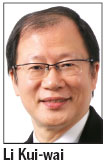Entrepreneurship and competitiveness still vital to our city
Updated: 2014-01-15 07:11
By Li Kui-Wai(HK Edition)
|
|||||||
What can we learn from the battle over the granting of the television licenses in Hong Kong in recent months? First, Hong Kong is definitely still a business center and free-market capitalism remains the main way of doing business. Amid the popular call by activists for more welfare and financial assistance to poorer sectors of society, economic life in Hong Kong still rests with the primary feature of Chinese behavior - entrepreneurship.
Indeed, people's own drives are the best economic fundamentals in Hong Kong. The more economic progress each individual makes, the higher the level of economic security one can achieve. This will in turn take care of their social security needs. Economic security ensures social security. Furthermore, the more able individuals will contribute more to the government through tax and rely less on welfare. By the same token, the more capable individuals are, the less they need welfare. This will reduce the number of people the government has to look after. Thus, on the one hand, there are a smaller number of needy people, while on the other more capable individuals will pay more to the government through tax. The government will then have more fiscal resources to help the needy. This is the first lesson of an economic philosophy that stresses a strong entrepreneurial spirit.

Risk-taking is another feature of entrepreneurship. Successful business people take calculated risks, and their decisions are often based on strategies and scenarios that provide them with sufficient margin for risk. There is a popular saying in business: "The higher the risk, the higher the profit". The truth is that profit is often a return for risk-taking. Socialists and pro-welfare activists tend to brand profit-taking as ruthless or immoral. But if business profits were that easy to make, why aren't more workers becoming entrepreneurs, and starting their own businesses? One should not confuse business profits with speculative gains in stocks and properties. Very often, business risk-taking requires heavy capital involvement. A successful business person has to be rich and has cash. But he or she must also have credit lines for unforeseen events and to meet the need for capital deployment.
Knowledge, hard work and business relationships are other lessons one can learn from the recent granting of television licenses in Hong Kong. Business confidence comes from a business person's knowledge. While capital is the engine, knowledge is the lubricant ensuring the engine runs smoothly. Indeed, television and entertainment business require a wide range of business, professional and technical knowledge. The late paramount leader Deng Xiaoping talked about "crossing the river by touching the stones" in regard to economic reform on the mainland. In business, one has to make sure one is "touching the right stones and crossing the right river". A successful business person has to be devoted and know what they are doing. This goes beyond strategy; a sense of astuteness and intelligence is needed, to work out every move ahead and avoid the pitfalls.
Businesses in Hong Kong are "system-driven". This is an a-political attitude that Hong Kong has established as a well-defined system. It stands between any individual and the government. Certainly, there is a need to refine various aspects of the Hong Kong business system, but the institution of a well-defined system provides a "level playing field" for all businesses. Personality has no role in this, even if it involves the highest authority in Hong Kong. How businesses conduct their activities and whether the private market is "saturated" is not the decision of any single individual, it is the decision of the market.
Hong Kong is a magnet for entrepreneurs. Innovative and creative individuals find Hong Kong a rewarding place to start their businesses. They don't have to worry about a high tax system; they have the potential to enter the mainland market; and can enjoy a transparent system uncorrupted by cronyism. The success of one entrepreneur will encourage others to hunt for their first "bucket of gold".
The author is an associate professor of the Department of Economics and Finance at City University of Hong Kong.
(HK Edition 01/15/2014 page1)